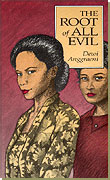The Root of All Evil
 The news of her sick father beckons Komala to return to Jakarta, leaving her husband and children behind in Melbourne, now her home city.
The news of her sick father beckons Komala to return to Jakarta, leaving her husband and children behind in Melbourne, now her home city.
But the Jakarta she left nine years earlier has changed. The city has changed and the society is disturbingly foreign to her. Or has she changed? Komala’s is a poignant homecoming to a troubled land.
Komala’s return even to her family home is difficult, with live-in boarders and her hostile sister in law disturbing her smooth transition back to the place of her childhood.
Through one of her mother’s boaders, Komala learns of a vicious attack on a nightclub hostess, an acid attack which leaves the young woman blinded and horribly scarred. In her attempt to win some justice and compensation for the victim, Komala becomes aware of a wider world of corruption and exploitation, particularly of women.
This exploitation is made worse by the lack of solidarity among the women in Jakarta. The society is still one where man are supreme, and the women acquiese in this, allowing themselves to be dependent on a husband or lover, thereby allowing men to retain control.
The Root of All Evil is a novel as relevant today as when first released. The path for women’s liberation in many South East Asian countries still hinges very much on how women themselves view the woman who dares to declare her independence in the male-dominated society.
May 1987, 140pp
Paperback, 215 x 138 mm
ISBN 0 9587718 0 4
Fiction, 1st edition
RRP $aud 16.95
ISBN-13 978
The Author
As a published writer of novels, short stories and essays, and an established role as a regional journalist, Dewi Anggraeni is well-known in both Australia and Indonesia, especially among those in both countries who maintain an interest in regional affairs.
Her major works have been published by Indra Publishing:
Who Did This To Our Bali?, 2003
Snake, 2003
Neighbourhood Tales: A Bilingual Collection, 200
1Journeys Through Shadows, 1998
Stories of Indian Pacific, 1992
Parallel Forces, 1988
The Root of all Evil, 1987
Dewi’s poetry, short stories and essays appear in anthologies from a range of publishers:
“Journey to My Cultural Home” in Weaving a Double Cloth; Stories of Asia Pacific Women in Australia (Ed. Myra Jean Bourke, Susanne Holzknecht and Annie Bartlett, Pandanus Books, 2002)
“Exposing Crimes Against Women” in The Last Days of President Suharto (Ed. Edward Aspinall, Herb Feith and Gerry van Klinken, Monash Asia Institute, 1999)
“Rejected by Ibu Pertiwi” in Motherlode (Ed. Stephanie Holt and Maryanne Lynch, Sybylla Feminist Press, 1997)
“From Indonesia to Australia and Back: Cultural Sensitivities” in Crossing Cultures: Essays on Literature & Culture of the Asia-Pacific (Ed.Bruce Bennett, Jeff Doyle, Satendra Nandan, Skoob Books, 1996)
“Illegal” in Our Heritage (Ed. Satyagraha Hoerip, Pustaka Binaman Pressindo, 1993)
“Irritations” in Striking Chords (Ed. Sneja Gunew and Kateryna O Longley, Allen & Unwin, 1992)
“Mal Tombé” in Beyond the Echo (Ed. Sneja Gunew and Jan Mahyuddin UQP, 1988)
“A Foreigner in East Gippsland” in Up From Below (Women’s Redress Press Inc., 1987)